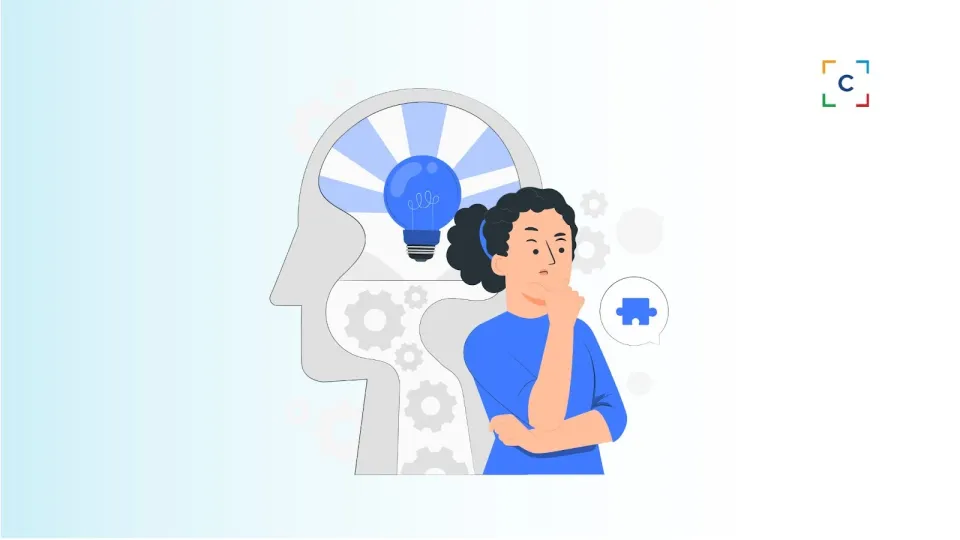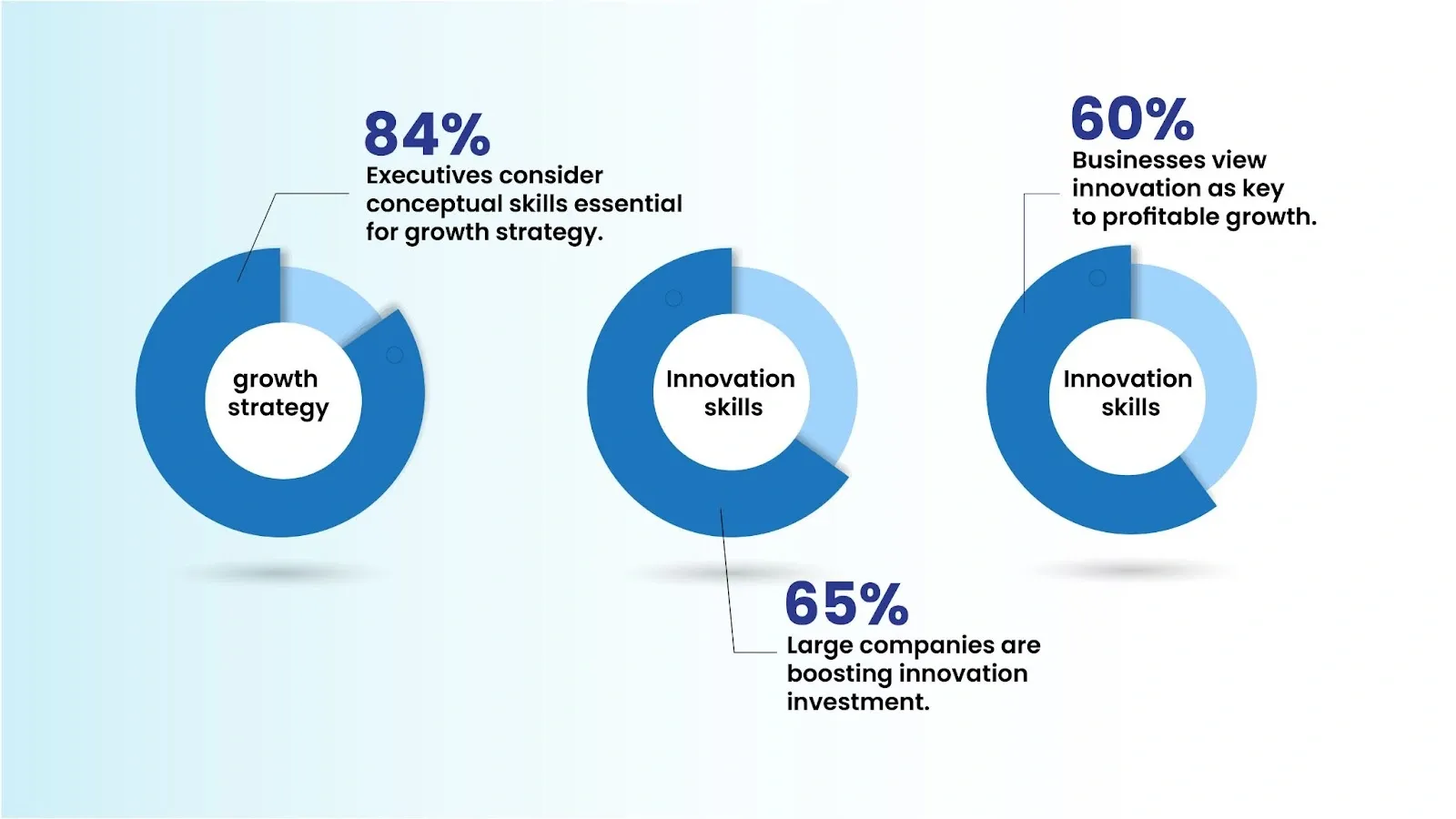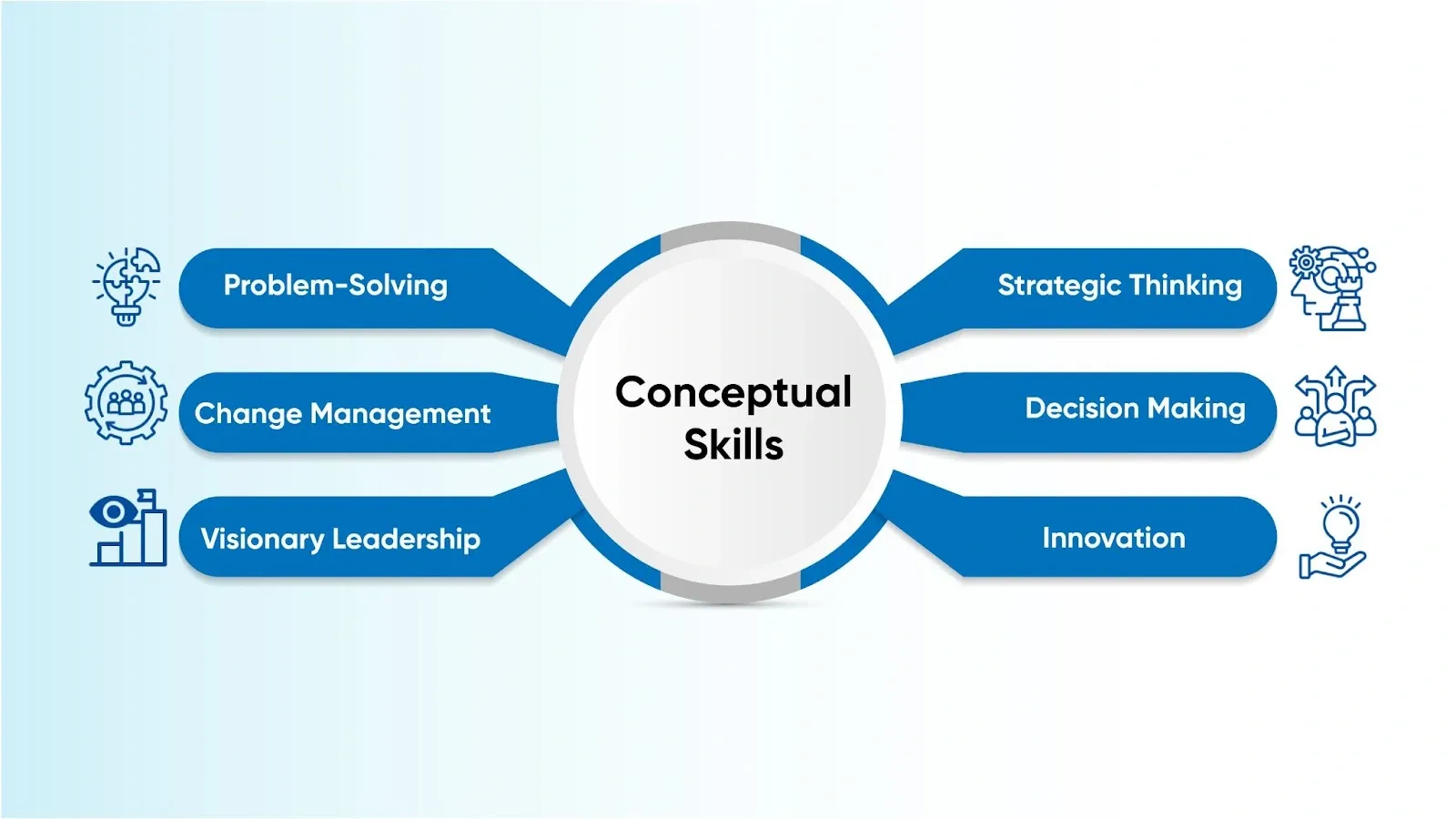Understanding Conceptual Skills: Definition, Examples, and Significance

Conceptual skills are an important part of showing abilities, allowing individuals to understand, analyze, and solve problems.
Identifying conceptual skills or learning these skills is an add-on to your CV.

In fact, the stats show that 84% of executives agree that conceptual skills are important for their company's growth strategy. That concludes CEOs are more focused on conceptual skills. In the next three years, 65% of large companies plan to boost their investment in innovation and 60% of businesses consider innovation to be a crucial factor for driving profitable growth.
In the ever-evolving landscape of professional development, mastering a variety of skills is crucial for success. Conceptual skills stand out as fundamental for leaders and managers across industries. But what exactly are conceptual skills?
Conceptual Skills Definition
Conceptual skills involve the ability to work with abstract concepts and ideas. They're crucial across all levels of an organization, but their importance grows with seniority. At the core, these skills allow individuals to see the big picture, understand how different parts of a business are interconnected, and develop strategic plans that align with the company's overall objectives.
Examples of Conceptual Skills
Now that you are familiar with conceptual skills let's look at some examples that you can include in your application. Skills that fall under the conceptual framework include but are not limited to analytical thinking, creative problem-solving, strategic planning, decision-making, and innovation.
These skills collectively facilitate an individual’s ability to navigate and solve problems, innovate, and lead effectively. So, what are you waiting for? Let’s add some spices to your resume and make you stand out of the crowd.

Strategic Thinking
Leaders with strong skills excel in strategic thinking. They can assess an organization's current state, easily analyze market trends, and envision future opportunities and threats.
Using the conceptual ability to imagine long-term goals, anticipate future challenges, and develop plans to achieve organizational objectives.
Problem-Solving
Conceptual skills are important for effective problem-solving. With the skill of problem-solving, you can easily analyze complex problems, break them down into manageable components, and identify underlying causes.
By understanding the broader context of problem-solving, you can think of the box and come up with innovative solutions to challenges.
Decision Making
Usually, leaders encounter problems where they must make critical decisions with far-reaching consequences. Conceptual skills enable them to evaluate multiple alternatives, assess potential outcomes, and make informed decisions aligned with company objectives.
These skills help you consider the broader implications of their choice and anticipate their impact on various stakeholders.
Change Management
In today’s dynamic business environment, organizational change is unavoidable. A person with strong conceptual skills can effectively manage change by understanding its underlying driver, anticipating resistance, and developing strategies to facilitate change.
This can help you communicate a compiled vision for change and navigate complexities to achieve desired outcomes.
Innovation
Conceptual skills are closely related to innovation and creativity. Individuals with these skills can think outside the box, challenge assumptions, and generate novel ideas to drive innovation.
By understanding the competence to foster a culture of innovation, encourage experimentation, and facilitate the development of novel ideas.
Visionary Leadership
Visionary leaders have a clear vision of the future, inspire others with their strategic insights, and motivate them to pursue ambitious goals. Through effective communication and strategic alignment, they translate their vision into actionable plans that guide organizational success.
By developing these skills, individuals can enhance their capacity to think strategically, solve problems creatively, and drive innovation within their organizations.
Sharpen and Enhance Conceptual Skills
Developing and enhancing conceptual skills is crucial for professionals aspiring to become effective leaders and managers. These skills are essential for strategic thinking, solving complex problems, and innovative solutions.
Here are some strategies to sharpen and enhance conceptual skills.
Continuous Learning
Engage in lifelong learning by pursuing formal education, attending workshops, seminars, and conferences, and enrolling in relevant courses. Explore topics such as strategic management, systems thinking, decision-making, and creative problem-solving to broaden your conceptual understanding.
Read Widely
Expand your knowledge base by reading books, articles, and publications across various disciplines, including business, psychology, economics, and sociology. Reveal yourself to diverse perspectives, theories, and concepts to develop a holistic understanding of complex issues.
Practice Critical Thinking
Work on your critical thinking skills by questioning assumptions, evaluating evidence, and analyzing arguments. Practice dissecting complex problems, identifying underlying patterns, and considering multiple perspectives before formulating solutions. Engage in debates, discussions, and brainstorming sessions to enhance your analytical abilities.
Look For Mentorship
Find mentors or advisors who possess strong conceptual skills and are willing to guide and mentor you. Learn from their experiences, insights, and perspectives, and seek feedback on your ideas and approaches. Collaborate with mentors on projects and initiatives to gain hands-on experience and practical knowledge.
Develop Systems Thinking
Develop a systems thinking approach to understand the interconnectedness and interdependencies within complex systems. Explore how different components interact and influence each other within organizations, industries, and broader societal contexts. Use tools such as causal loop diagrams, systems mapping, and scenario analysis to visualize and analyze complex systems.
Practice Strategic Planning
Develop your strategic planning skills by analyzing market trends, competitive dynamics, and organizational capabilities. Create strategic plans that align with the organization's mission, vision, and goals while considering potential risks and uncertainties. Monitor progress, evaluate outcomes, and adjust strategies as needed to adapt to changing circumstances.
Stay Updated
Stay updated on emerging trends, technologies, and best practices within your industry and related fields. Follow thought leaders, thought-provoking blogs, and reputable publications to stay informed about the latest developments and innovations. Incorporate new knowledge and insights into your thinking and decision-making processes to stay ahead of the curve.
Reflect and Iterate
Take time to reflect on your experiences, successes, and failures, and extract valuable lessons from them. Continuously seek opportunities for growth and improvement, and be open to feedback and constructive criticism. Iterate on your approaches, experiment with new strategies, and refine your conceptual skills over time to become a more effective leader and manager.
Importance of Conceptual Skills in the Professional World
Conceptual skills are particularly crucial for top management and leadership roles. They underpin the ability to develop company goals, visions, and strategies, significantly impacting decision-making and organizational direction. Let us discuss some of the reasons why conceptual skills are important.
Innovation and Adaptability
Conceptual skills are essential for fostering innovation and adaptability within organizations. Professionals with strong conceptual skills can envision new products, services, and processes, identify emerging trends and opportunities, and adapt to changing market conditions.
By embracing innovation and creativity, organizations can maintain a competitive edge and thrive in a rapidly evolving landscape.
Leadership Effectiveness
Effective leadership requires the ability to think strategically, communicate a compelling vision, and inspire others to achieve common goals. Conceptual skills are fundamental for leaders to develop long-term strategies, navigate uncertainty, and lead organizational change initiatives.
By leveraging their conceptual skills, leaders can motivate teams, foster collaboration, and drive sustainable growth and success.
Cross-Functional Collaboration
In today's interconnected world, professionals often collaborate with colleagues from diverse backgrounds and disciplines. Conceptual skills enable professionals to communicate effectively across different functional areas, bridge knowledge gaps, and facilitate cross-functional collaboration. By leveraging their conceptual understanding, professionals can align diverse perspectives, leverage collective expertise, and achieve synergistic outcomes.
Organizational Performance
Conceptual skills contribute to overall organizational performance by enhancing decision-making processes, fostering innovation, and driving strategic alignment. Professionals who possess strong conceptual skills can identify opportunities for optimization, streamline processes, and maximize resource utilization. By leveraging their conceptual abilities, organizations can enhance efficiency, effectiveness, and profitability.
Personal and Professional Growth
Developing conceptual skills is beneficial for professional success and personal growth and development. By honing their critical thinking, problem-solving, and strategic planning abilities, professionals can enhance their overall cognitive agility and decision-making capabilities. These skills empower individuals to approach challenges with confidence, resilience, and a growth mindset, driving continuous learning and improvement.
These skills allow leaders to oversee operations comprehensively, ensuring alignment with the company’s broader objectives and fostering a unified direction despite the diverse goals of individual units or departments.
Application in Various Professions
Conceptual skills are important for various professions. They enable professionals to think strategically, solve problems, and drive innovation. Here is how conceptual skills apply to different fields.
Business and Management
- Leadership: Executives and managers use conceptual skills to develop long-term strategic plans, set organizational goals, and effectively lead their teams.
- Strategic Planning: Business strategists analyze market trends, competitive dynamics, and organizational capabilities to develop comprehensive strategic plans that guide decision-making and resource allocation.
- Entrepreneurship: Entrepreneurs leverage conceptual skills to identify market opportunities, develop innovative business models, and navigate the complexities of starting and growing a successful venture.
- Change Management: Change agents employ conceptual skills to lead organizational change initiatives, anticipate resistance, and foster a culture of innovation and adaptability.
Engineering and Technology
- Systems Thinking: Engineers and technologists apply conceptual skills to understand the interrelationships between different components of complex systems, such as infrastructure networks, software architectures, and manufacturing processes.
- Innovation: Technological innovators use conceptual skills to envision new products, technologies, and solutions that address emerging needs and disrupt existing markets.
- Problem-Solving: Engineers utilize conceptual skills to analyze technical challenges, identify root causes, and develop innovative solutions using principles of design thinking and systems engineering.
Healthcare and Medicine
- Clinical Decision-Making: Healthcare professionals employ conceptual skills to diagnose complex medical conditions, develop treatment plans, and coordinate care across multidisciplinary teams.
- Public Health: Public health experts utilize conceptual skills to analyze epidemiological data, identify health disparities, and develop policies and interventions aimed at improving population health outcomes.
- Healthcare Management: Healthcare administrators use conceptual skills to optimize hospital operations, allocate resources efficiently, and adapt to changes in healthcare policy and regulations.
Education and Academia
- Curriculum Development: Educators leverage conceptual skills to design innovative curricula that align with educational standards, foster critical thinking, and promote interdisciplinary learning.
- Research: Academics apply conceptual skills to formulate research hypotheses, design experiments, and analyze data to advance knowledge within their fields of study.
- Instructional Design: Instructional designers use conceptual skills to develop engaging learning materials and technology-enhanced instructional strategies that cater to diverse learning styles and preferences.
Finance and Economics
- Investment Analysis: Financial analysts utilize conceptual skills to assess market trends, evaluate investment opportunities, and develop investment strategies that maximize returns and minimize risks.
- Economic Policy: Economists apply conceptual skills to analyze macroeconomic trends, assess policy implications, and provide recommendations to policymakers on issues such as fiscal policy, monetary policy, and international trade.
- Risk Management: Risk managers employ conceptual skills to identify potential risks, assess their likelihood and impact, and develop risk mitigation strategies to protect organizations from financial losses and disruptions.
In each of these professions, conceptual skills enable professionals to navigate complexity, drive innovation, and achieve success in their respective fields. Likewise, presenting your conceptual skills in your interview or resume is as important as enhancing them. The recruiter will not just believe you if you wrote some skills in your resume, or one may shoot many questions to think about your skills.
But guess what? There is a lifesaver for you- getCREDIBLE. An online tool that allows you to showcase your skills in a meaningful and trustworthy manner where you can get genuine feedback on them. This will enable you to get better career opportunities.
Introducing getCredible
getCREDIBLE is revolutionizing professional branding with its cutting-edge digital resumes. Central to this transformation is the 'Slate,' a dynamic document that evolves alongside your career, keeping your profile fresh and showcasing your abilities.
Key features of getCREDIBLE include:
- Instant updates to your profile
- AI-generated summaries of significant achievements
- A professional network for collaboration and growth
- Milestone-driven evaluations and feedback
- Ongoing feedback mechanisms for continuous enhancement
- An intuitive interface for crafting a compelling professional narrative.
Conclusion
For those seeking credible resources and expert guidance on skill development, platforms like getCredible.pro can be immensely beneficial.
By enhancing getCredible, professionals can access reputable resources, learn from industry experts, and accelerate their personal and career growth.
Visit getCredible & unlock new opportunities that drive organizational success and meaningful contributions to the respective industries.
